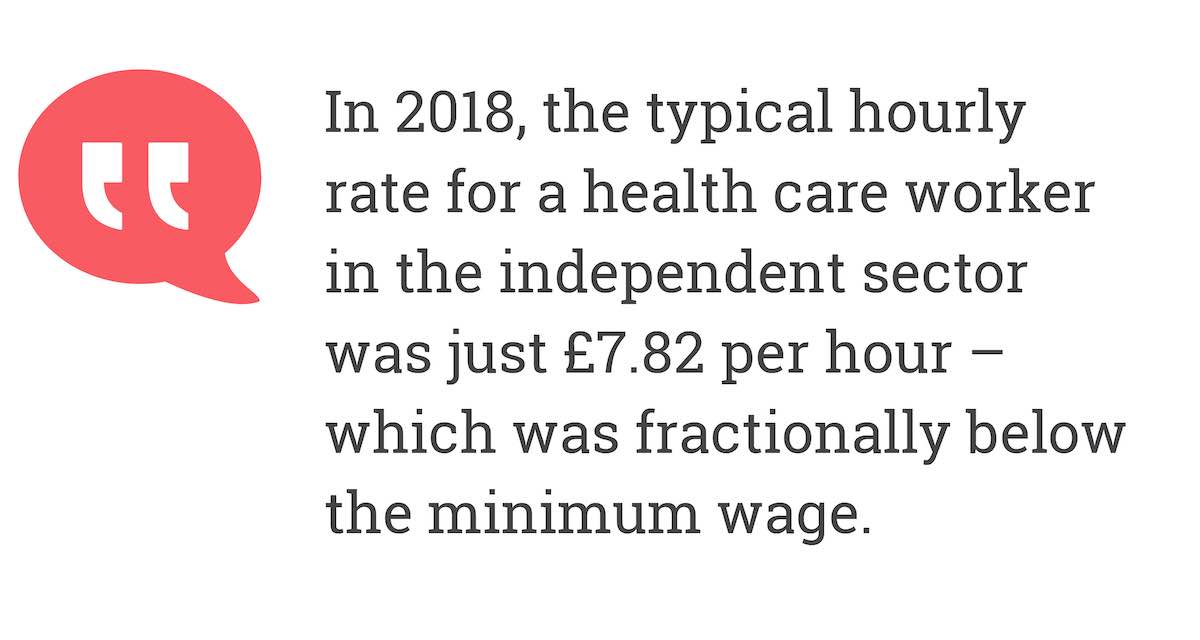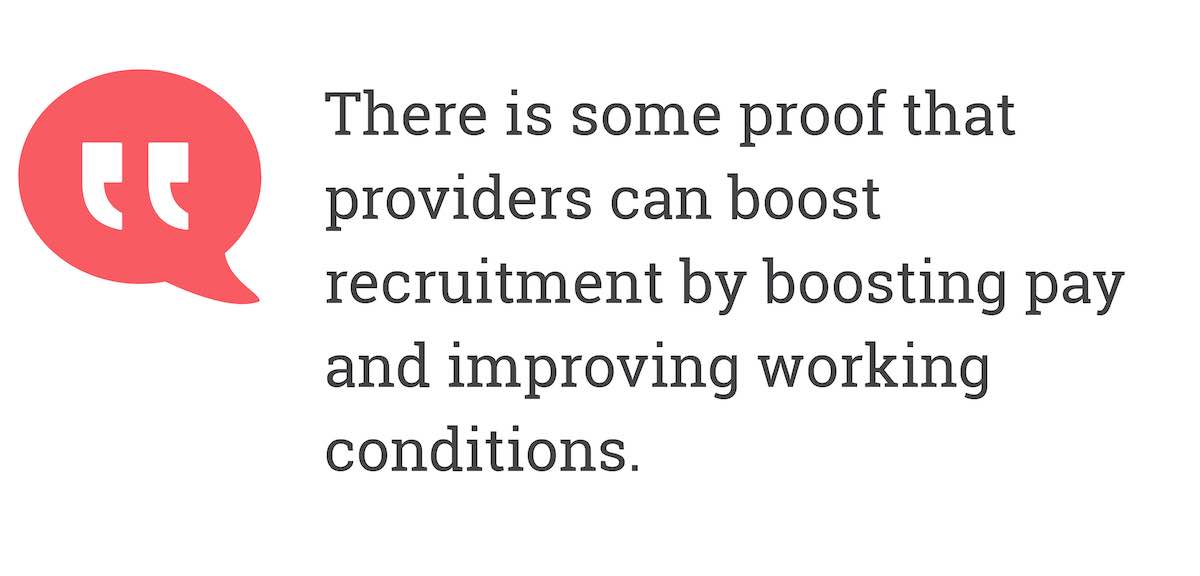- 29 April 2020
- 6 min read
What does the Government's 2020 recruitment campaign to create 110,000 social care jobs mean?
Subscribe "With such a big hill to climb, how does the government plan on filling all these roles?"
"With such a big hill to climb, how does the government plan on filling all these roles?"With a rapidly ageing populace, the UK Government are attempting to keep up with the demand for social care workers with the ‘Every Day is Different’ campaign. Here we explain what that means for you.
Topics covered in this article
Boosting the industry reputation
Is the problem recruitment, or retention?
Light at the end of the tunnel?
Where next for social care recruitment?

Search Jobs
1000s of jobs for Nurses & Care Professionals. No.1 for UK nursing, care & healthcare jobs.
Search JobsIntroduction
The government’s campaign to fill 110,000 social care vacancies throughout the UK began in February 2020.
It comes in reaction to the fact that a predicted 650,000 extra social care workers will be needed by 2035 to keep up with the increasing proportion of the UK population that’s over 65.
Known as the ‘Every Day is Different’ campaign, it celebrates the fact that 96% of social care workers feel that their work makes a difference.
But with such a big hill to climb, how does the government plan on filling all these roles?
And how realistic is this ambition?
Boosting the industry reputation
The government’s stated strategy is threefold.
It intends to attract new people with the right values to the sector; to highlight the wide range of roles available; and to equip the sector with the marketing tools it needs to attract and retain great staff.
The main marketing channels are social media, digital and local radio, and various events throughout the year.
It’s targeting people aged between 20 and 39 as research suggests this is the demographic most likely to consider the role.
The COVID-19 crisis has of course impacted these plans – but it hasn’t diminished the need for more social care staff.
In fact, what it is highlighting is the pressing need for more numbers of qualified staff to support an ageing population.
Social care workers are on the frontline too.

What Do You Think?
Ask questions, comment and like this article below! Share your thoughts, add your opinion in the comments below.
CommentIs the problem recruitment, or retention?
It’s been widely reported that around 400,000 people leave the profession each year – and the workforce currently stands at approximately 1.45 million.
So a big question has to be asked: should the focus be on recruitment, or retention?
Because a turnover rate of more than 30% is unsustainable.
The answer almost certainly is both.
And it’s unclear whether this campaign will attempt to address both issues.

In 2018, the typical hourly rate for a health care worker in the independent sector was just £7.82 per hour – which was fractionally below the minimum wage.
Any campaign to attract and retain social care workers has to target this problem over any other.
Because, to put it simply, you can’t attract professionals without a professional wage.
Is pay the only problem?
It’s fair to assume that the notoriously low salaries available for social care workers is a key factor behind the consistent failure to attract and retain enough staff.
But it isn’t fair to assume it’s the only problem.
With a vacancy rate of around 8% in social care, compared to an average of 3% in other sectors, there have to be other challenges too.
The problem for the government however is that social care work is largely independently and unregulated run by private employers, so collecting and sharing staff data has always been a problem.
Nonetheless, it’s anecdotally suggested that the perceived low status of social care work is another factor – which explains the government’s focus on improving it.
And the other most widely agreed issue is career progression.
A 2019 survey by UNISON also discovered that social care workers are more likely to leave their roles if they’re younger and less experienced.
This suggests two interesting points.
Firstly, that retention can improve when social care workers spend some time in the job and develop their career.
And secondly, that improved training, therefore, could also lead to improved retention.
The same survey found turnover was higher among staff without a qualification.
As yet, it isn’t clear how the government campaign will address these issues.
But it will undoubtedly have to tackle them if the 110,000 figure is ever to become a reality.

Become A Community Contributor
Share your story to help and inspire others. Write or create a video about your job or your opinions!
ContributeLight at the end of the tunnel?
It’s been reported by The Health Foundation, among others, that smaller and not-for-profit organisations have lower turnover and vacancy rates – and more success when recruiting.
Unsurprisingly, it’s also been noted that these companies tend to offer better pay, and better working conditions.

So, there is some proof that providers can boost recruitment by boosting pay and improving working conditions.
How the government imposes pay increases across the board is, however, a difficult challenge.
Where next for social care recruitment?
The fact there is a focused government campaign to recruit more social care workers is positive in and of itself.
The sector needs the spotlight, given it has the highest staff turnover rates of any sector in the country.
And with COVID-19, far from making this issue less relevant, the need for more social care workers has become even more pronounced.
It’s expected that some insights into the success of the campaign to date will be revealed in the summer of 2020.
It’s hoped that a significant dent will have been made in the figure of 110,000.
But it remains to be seen whether that’s realistic.
And whatever happens, the government will need to address turnover too, or its recruitment work will be completely undermined.






About this contributor
Nurses.co.uk Founder
I launched Nurses.co.uk (and subsequently Socialcare.co.uk, Healthjobs.co.uk and Healthcarejobs.ie) in 2008. 500 applications are made every day via our jobs boards, helping to connect hiring organisations recruiting for clinical, medical, care and support roles with specialist jobseekers. Our articles, often created by our own audience, shine a light on the career pathways in healthcare, and give a platform to ideas and opinions around their work and jobs.
More by this contributorWant to get involved in the discussion?
Log In Subscribe to commentZuva Chinhori
Zuva Chinhori
4 years agoRecruitment and retention are the main issue but they’re affected by other issues too. I speak from my experience of ... read more
Recruitment and retention are the main issue but they’re affected by other issues too. I speak from my experience of working as a Carer/Care Assistant 1. What’s happening before the recruitment phase? The messaging regarding care work needs to be addressed. We hear “rewarding” mentioned a lot. Whilst it’s true that care work can be rewarding- it’s also true that care work is very demanding and that reality needs to be spoken more of especially to people who maybe taking an interest in care work for the first time. This is so people can make an informed decision about whether they want the job or not. This would also improve retention to an extent. I guess the challenging side of care work is not talked about much to avoid putting people off but actually I think that’s more damaging in the long run. We know very well that care work doesn’t have the best reputation. Before the Covid situation highlighting the importance of the sector - all we were used to seeing for years is the negative media about care abuse and bad carers. Well why was this abuse happening? Is it just because someone is just a horrid and sh***y person or something else is going on? An unprepared, perhaps over worked, stressed person who loses it in the moment? (By the way I am not excusing abuse) I am only trying to make the point that before recruitment takes place or at least at the training stage people need to be made aware of these challenges that could take place and then steps taken to adequately prepare them. This can be done. And the solution: Experienced carers should have more of a say in developing care training because only they can truly understand what it’s like. Somebody in government ,whose likely never been a care worker, calling the shots won’t cut it. 2. Progression - Or lack of progression. You become a care worker and then maybe a senior care worker and then what? There isn’t much to care work in terms of job tasks. So it doesn’t take long before the work becomes repetitive and a person feels stagnant. Those that can deal with the day to day challenges of care work eventually leave to seek more for themself. Low wages are not always the cause of people leaving. It’s in our nature as human beings to evolve and to seek fulfilment. Sadly care work doesn’t always deliver that fulfilment. Again this goes back to what is said about care work being “rewarding” fulfilling etc To an extent but not entirely. How can we improve career progression in care work? Well interestingly a lot of care business owners or consultants started off as care workers. So how about we highlight these possibilities to people. How about we start looking at care work as a stepping stone to that end goal? Laying a new path for people. Running a care business might not be everybody’s dream but there are many other ventures that can come out of experiencing care work.
read less
Thanks Zuva. Some really interesting ideas in there that I'd like to hear more about. I'm going to DM you!